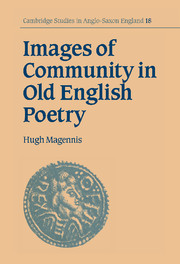Book contents
- Frontmatter
- Contents
- Acknowledgements
- List of abbreviations
- 1 Introduction: ideas of community and an Anglo-Saxon audience/readership
- 2 Hall and city, feasting and drinking: images of communal life
- 3 Hall and feasting in Beowulf
- 4 Hall and feasting: transformations and alternative perspectives
- 5 Personal in conflict with communal
- 6 The mythic landscape of Beowulf: sea, stronghold and wilderness
- 7 The dwelling-places of God's people: place and setting in biblical poetry
- 8 Places of trial and triumph in hagiographical poetry
- 9 Conclusion: community and power in later poetic and other texts
- Bibliography
- Index
4 - Hall and feasting: transformations and alternative perspectives
Published online by Cambridge University Press: 14 August 2009
- Frontmatter
- Contents
- Acknowledgements
- List of abbreviations
- 1 Introduction: ideas of community and an Anglo-Saxon audience/readership
- 2 Hall and city, feasting and drinking: images of communal life
- 3 Hall and feasting in Beowulf
- 4 Hall and feasting: transformations and alternative perspectives
- 5 Personal in conflict with communal
- 6 The mythic landscape of Beowulf: sea, stronghold and wilderness
- 7 The dwelling-places of God's people: place and setting in biblical poetry
- 8 Places of trial and triumph in hagiographical poetry
- 9 Conclusion: community and power in later poetic and other texts
- Bibliography
- Index
Summary
Two types of transformation of the hall imagery outlined in the previous chapters are widely found in Old English poetry. These may be seen broadly as: (i) transformations which exploit discrepancy and irony while endorsing the underlying values of hall culture, and (ii) those in which the connotations of hall imagery are brought into question and indeed inverted by Christian poets unsympathetic to the heroic world. There is also evidence in Old English poetry of a third response to the values of hall life, though this response is not widely exemplified in the surviving manuscripts from the late Anglo-Saxon textual community. In this response, which is associated in existing poems particularly with the perspective of women, the social values of the outer world are shown in conflict with the demands of personal emotion. The present chapter concentrates on the first two types of transformation. We shall return to the third response in ch. 5.
DISCREPANCY AND IRONY IN FEASTING IMAGERY
The first type of transformation is well understood by students of Old English poetry and does not require exhaustive attention here. This type of transformation has its basis in irony. It is the irony we observed in the preceding chapter in the reference in Beowulf to the dwelling-place of Grendel and his mother as a niðsele, ‘hall of evil’, and to Grendel as a healðegn, ‘hall-thegn’, in Heorot. Such irony is characteristic of the highly imaginative use of hall imagery in Beowulf.
- Type
- Chapter
- Information
- Images of Community in Old English Poetry , pp. 82 - 103Publisher: Cambridge University PressPrint publication year: 1996



